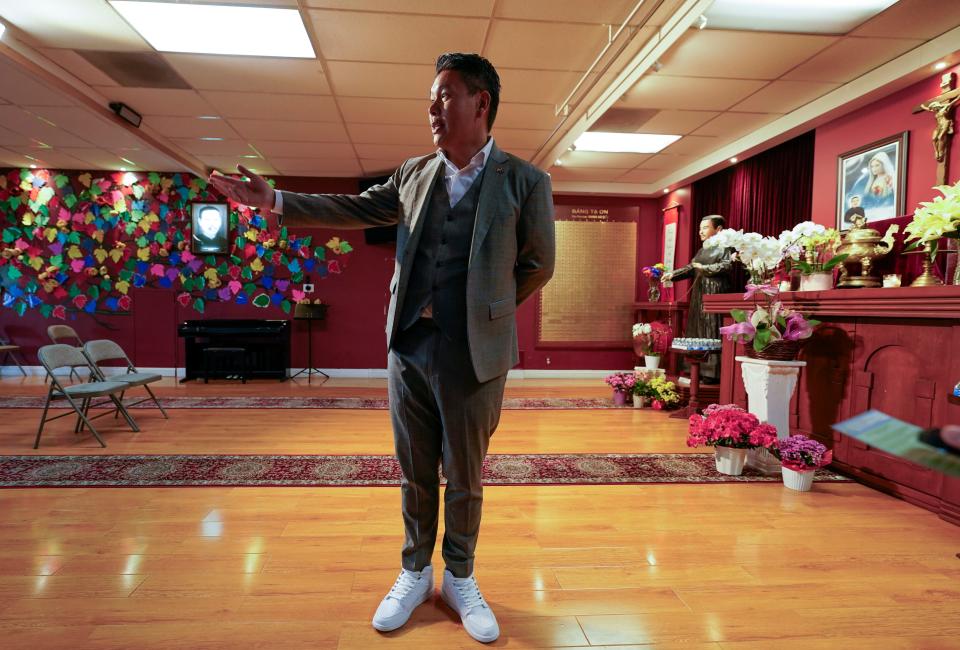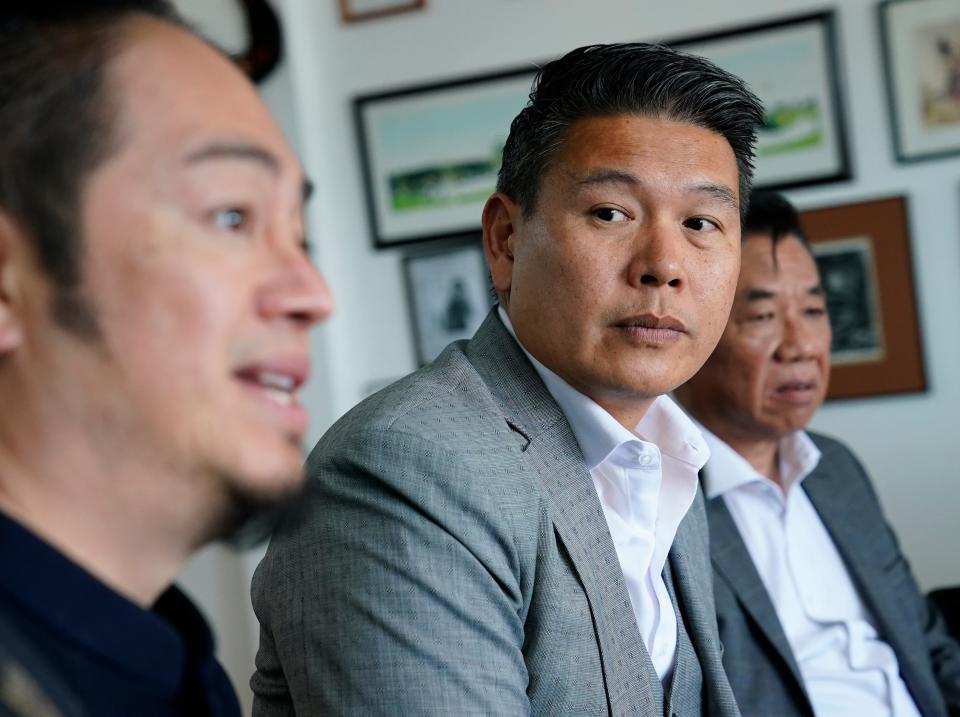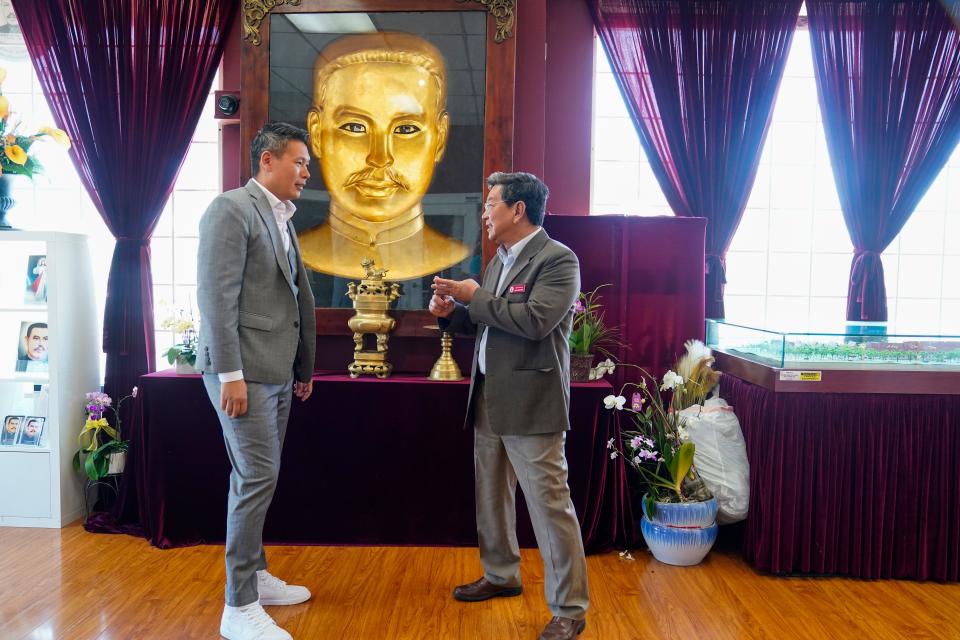WESTMINSTER, Calif. – On a cloudy recent holiday morning, as dozens of people who served in the South Vietnamese army mingled after honoring the memories of those who died in the Vietnam War, one veteran called out to his friends to "meet Derek!"
That would be Derek Tran, a micro-celebrity of sorts in Southern California's Vietnamese community who posed for Memorial Day selfies and shook hands with people interested in meeting the Democratic candidate for an Orange County-based U.S. House seat that his party sees as a critical part of its pathway to winning back the majority in November. The area he's running to represent is home to Little Saigon, a district with one of the largest Vietnamese populations outside of Vietnam itself.
Despite that claim to fame, Southern California's Little Saigon has never been represented by a Vietnamese American in federal office.
“It’s weird. It’s not something I’m used to,” Tran, who is Vietnamese, told USA TODAY of his newfound popularity as he made his way around a local park that features two towering statues of American and South Vietnamese soldiers standing side by side, flanked by their respective flags.
“But I take a lot of pride in their excitement about my race, so I take it as it comes," he added. "They’re appreciative and they are just happy to have someone … that’s going to be able to possibly give us a voice in Congress.”
Tran, a 43-year-old political newcomer who previously worked as a lawyer for personal injury and discrimination cases and served in the U.S. Army, is running a campaign in one of the nation’s few competitive House races in the upcoming elections that will determine which party will control the lower chamber and play a major role in shaping or killing the agenda for the White House winner. Highlighting the competitiveness of Tran's race, it's one of the handful of districts that President Joe Biden won in the 2020 election but is held by a Republican – Biden won there by 6 percentage points.
A key component behind Tran’s campaign is his background and ability to connect with the Vietnamese population that Democrats believe no prior candidate could. The hope is that Tran can convince and turn out those voters during a presidential election cycle where Biden will be at the top of the ticket in one of the nation's deepest blue states.
Whether Tran could capture those voters is essential to flipping the seat as he faces an uphill battle against two-term GOP incumbent Michelle Steel, a 68-year-old Korean American who is well established in local politics and one of the GOP’s strongest fundraisers among vulnerable members, boasting a massive campaign war chest. Though it was just a few days after Tran’s primary victory, at the end of March, Steel reported $3.2 million cash on hand compared with Tran’s near $200,000.
Not only that, Steel's campaign has capitalized on the Vietnamese community's GOP leanings before. She's already built a strong grassroots operation for voter outreach across the whole district that helped her win reelection in 2022, along with controversial messaging points that critics have decried as "red-baiting" to inflame fears of communism among Vietnamese voters.
Lance Trover, a spokesperson for Steel’s campaign, noted the race is about more than just the Vietnamese population in the district and said in a statement to USA TODAY that “Southern Californians of all ethnicities know who they can trust which is why they keep electing Michelle Steel.”
Despite the headwinds facing Tran, his campaign is touting internal poll numbers in the district that shows the Democrat in a dead heat with Steel, trailing her by just 1 percentage point among likely voters in the district in a head-to-head matchup.
But more notably, Tran far outperforms a generic Democrat among likely Vietnamese voters. Up against Steel, Tran is 3 points behind. Underscoring the Vietnamese community's lean towards the GOP, those same voters would favor a generic, unnamed GOP candidate by 25% compared with a generic Democratic candidate.
“There is a political machine behind all this,” Tran said, noting Steel’s husband, Shawn Steel, is also an important figure in the California GOP. “But that doesn’t slow my yearning and my ability to make sure that I beat her by out-canvassing her. I’m going to try to out-fundraise her, but she’s definitely had a head start on me.”
The Vietnamese community in the district runs through Little Saigon, a sprawling enclave of Vietnamese shopping centers, strip malls and restaurants built up in Orange County after hundreds of thousands of Vietnamese refugees flocked to the United States after the fall of Saigon marked the end of the Vietnam War in 1975.
Driving past Carrot and Daikon Banh Mi, a local Vietnamese sandwich shop, Tran recalled asking the restaurant’s owner, a Republican and current Army reservist, whether his campaign could plant signs in front of his business during the state's primaries. The owner turned them down.
But upon learning Tran was a veteran, the owner changed his mind. When California law permits – 90 days before the election day in November – those signs will again be there for the general election. “The fact that I was a veteran, he respected that, and he allowed us to use his property to place our signs, so that was cool,” Tran said.
Democrats are enthused to have a candidate like Tran, whose background as the son of refugees mirrors the life of so many in Little Saigon. But his candidacy could be undercut by the fact older Vietnamese voters harbor strong feelings against communism.
Vietnamese Americans are the only Asian American demographic to skew towards the GOP, which is perceived as having a stronger stance against China and communism. A Pew Research Center survey conducted last year found that 51% of registered Vietnamese voters either identified with or lean toward the GOP compared with 42% who favor the Democrats. That’s unlike other Asian American voters such as Chinese, Filipino, Indian and Korean voters.
“Don’t get me wrong. There’s people … like, ‘What's your party? What’s your party?’” Tran said. “And I tell them I’m a Democrat and they’re like: ‘Oh. We can’t vote for a Democrat, we’re Republican.’”
Tran says at times, he can “walk them through my upbringing and why I’m running” and for some of those voters, his background resonates and he’s able to persuade them. Others though, he cannot, “so we just leave it at that.”
2022 race marked by accusations of 'red-baiting'
Illustrating the visceral emotions Vietnamese Americans hold toward communism and the fear that drives some of them to the GOP, the South Vietnamese flag was seen flying across the Capitol on Jan. 6, 2021, as rioters besieged the building seeking to overturn the 2020 election.
The bright yellow flag bearing red horizontal stripes, commonly used as a symbol of freedom, stuck out to many in the Vietnamese community, flying alongside MAGA flags and displays of far-right symbols.
Tran is hoping to win over voters from the Vietnamese community who were appalled to see the South Vietnamese flag fly over the Capitol then.
“It was just being used inappropriately on Jan. 6. A lot of Vietnamese Americans were ashamed seeing that flag flying up like that,” said Phu Do Nguyen, an attorney and board member of the Vietnamese American Democratic Club in the area supporting Tran. “That flag represents all of us, not just one faction.”
Those feelings of resentment towards the regime that drove out so many who called Vietnam home still linger strongly in Little Saigon. Quan Nguyen, one of the founders of the Museum of the Republic of Vietnam, a humble one-room collection of items ranging from model warships to army uniforms to medals from the Vietnam War, described Little Saigon as the “capital of exiled Vietnamese” who are “very anti-communist.”
He added the community “is very divided” by those who continue to hold such strong feelings toward the communist regime and others who, while they still yearn for the restoration of freedom in their home, don’t hold such similar, intense feelings.
The political power of that sentiment was on full display in the district’s last election in 2022, when Steel faced off against Democratic challenger Jay Chen. Though Chen was the son of Taiwanese immigrants, Steel’s campaign tied him to the Chinese Communist Party, stoking fears in the Vietnamese community.
The attacks labeled Chen on signs as “China’s choice” and Vietnamese language mailers photoshopped him in a classroom holding a copy of “The Communist Manifesto.” Steel’s campaign faced heavy criticism from Democrats and accusations of “red-baiting.” Chen ultimately lost by less than 5 points, or a little more than 10,000 votes.
"When you're messaging particularly to a community like the Vietnamese community, which has a long history of trauma with the Communist Party, that's got to have an impact," Chen told USA TODAY, calling the attacks "blatantly racist."
"Those attacks are not going to land the same way," given Tran is Vietnamese, Chen said. "There are a lot of people in the Vietnamese community who are going to take offense to some of those attacks."
Tran echoed similar sentiments and said his background as the product of a community that fled communism and tyranny will withstand any labels the GOP tries to put on him.
“Steel is going to have a very hard time painting a son of this community as a communist because an attack on me as a Vietnamese American is an attack on my entire Vietnamese community out here,” Tran said. “She needs the votes out here and she can’t win this district without them.”
“I dare her to attack me and call me a communist because I know my community will respond right away,” Tran added.
Tran's heritage already poses strong appeal to some Vietnamese voters who have longed to see a candidate that looks and speaks like them.
Tran's unique strengths to connect with the voters of Little Saigon also comes from his familiar history for many in the community. His parents were among the 2 million Vietnamese boat people who after the war desperately sought to escape Vietnam to neighboring countries. He said his father attempted to flee with his first wife and youngest children, but their boat capsized and Tran’s father was the only one who survived the accident. Back in Vietnam, his father met his mother and managed to successfully flee Vietnam, later relocating to the U.S. where Tran was born.
His family history though is difficult for Tran to recount, describing it as “uncomfortable” to speak openly about and noting it’s not part of his stump speech on the campaign trail: “It’s not my story to tell.”
Democrats see new chance in Tran: 'He's fluent'
Tran’s background will be a key defense against any attempts to tie him to communism, one political consultant for California Democrats said on the condition of anonymity to speak candidly given the high stakes of the House campaign. “It was a rough one to put it mildly,” the consultant said about Steel’s attacks and Chen’s campaign. Come Election Day, the race is expected to be close and if Tran does win, it won’t be by a large margin. Though the consultant also argued Tran's fluency and connection with the Vietnamese community offers Democrats a much stronger chance to flip the seat.
A GOP consultant working on House races, who also spoke to USA TODAY on the condition of anonymity to candidly discuss the competitive election, echoed the same sentiment and noted Steel is a familiar name for many voters in the district. The GOP consultant dismissed Tran's use of his background as more of a “talking point.”
To be successful in 2024, Democrats will need to invest in outreach centers and canvass directly to voters in the entire district rather than just make a broad stroke political play solely around Tran's Vietnamese lineage, according to the GOP consultant who noted both Steel and Rep. Young Kim, another California Republican and Korean American, invested heavily in Asian American voter outreach to build strong grassroots operations that led to their election wins. Chen shared similar feelings, arguing Democrats need "to focus on the AAPI vote and not take it for granted even though AAPIs in general vote Democratic, they can't take this constituency for granted."
Whether Tran will be able match Steel's campaign operation remains “to be seen,” the GOP consultant said, noting the fundraising gap between Steel and her Democratic opponent. Tran’s campaign is still in the process of building a ground game akin to Steel’s. The campaign arm of House Democrats, the Democratic Congressional Campaign Committee, has begun to invest in voter contact, community outreach and organizational support for Tran's campaign.
The district’s location is another headwind for Tran’s campaign, given that advertising rates in the Los Angeles media market are among the most expensive in the country.
“She has good name recognition,” Tuong Thang, Vietnam news director of Saigon Broadcasting Television Network, a Vietnamese language television network based out of Little Saigon, said of Steel. “A lot of people already know her," Thang added, noting her time in local politics serving on Orange County's board of supervisors.
But Thang argued that Tran is uniquely positioned to win over the Vietnamese community. Though the district also includes a sizable Korean American and Hispanic population, “the swing vote” that will decide the election is in Little Saigon, Thang said.
“To be honest, Jay’s my friend, (but) he didn’t make the investment in the Vietnamese community that Derek will. It’s not just having surrogates here and there but really having a full on campaign in the Vietnamese community,” said Phu Nguyen, a trustee on the Fountain Valley School district who is supporting Tran. “I think it was a missed opportunity for him.”
Parts of the community are already planning to rally support for Tran in Little Saigon. John Nguyen, co-founder of the Truong Buu Diep Foundation, a faith-based nonprofit honoring Father Truong Buu Diep, a Vietnamese Catholic priest, said he has “to share with everyone about how good he is.”
The Truong Buu Diep Foundation, where people from any faith can stop by to pray, offers various free walk-in resources for locals who may need assistance navigating federal government programs such as Social Security and Medicare. For a few years, Tran would offer his own legal knowledge to help those who needed advice on personal and family legal issues.
Those resources are critical for the community, Nguyen said, since “most of them, they don’t know (how to) speak English and they need help from people who have licenses and knowledge.”
Nguyen says he’s going out of his way to support Tran “because of (the) relationship” he’s built with the Democratic candidate over the years he volunteered for the foundation. When he learned Tran was running for Congress, Nguyen thought that he and his foundation had “to support him totally.”
“I do feel inspired when I hear them talk" about him and his campaign, Tran said. “But I also feel the burden that they put on me. It would be very hard to face them should I lose this election.”
Whether Nguyen and other community members' support will be enough for Tran and Democrats to flip the seat and give Little Saigon its first Vietnamese representative in Congress is uncertain. For now though, just having a candidate in the first place, almost 50 years after the fall of Saigon, is already an achievement.
Back in Westminster Memorial Park, where Tran and the rest of the attendees moved the Memorial Day processions to plant incense and South Vietnamese flags to honor 81 unknown Vietnamese airmen, a few local Vietnamese language reporters stood by, waiting to interview Tran. After the processions, Tran made himself readily available for any of their questions. He answered in both English and Vietnamese.
“Handsome guy!” one of the local news network reporters quipped, making sure to get a picture with the potentially history-making Democratic candidate after their interview.
This article originally appeared on USA TODAY: Southern California micro-celebrity looks to make history in the House



